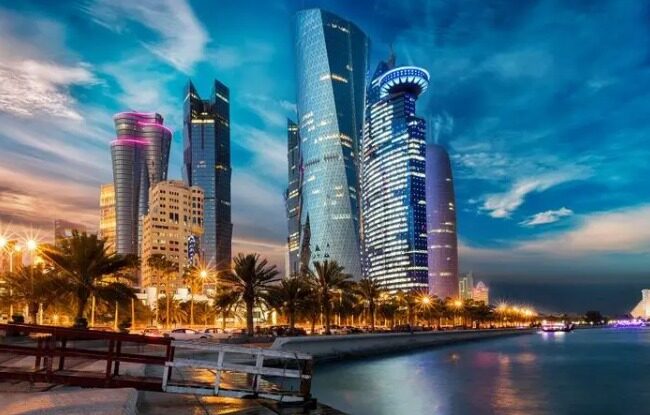The real estate sector will help to diversify Qatar’s economy in 2023 as the country looks to reiterate its position on the global investment map following the 2022 FIFA World Cup
Government spending on major projects is expected to be scaled back following the completion of the football tournament.
However, infrastructure investments will continue to remain an economic priority in light of Doha’s shifting focus on non-oil sectors.
READ MORE: Stats to remember from an unforgettable Qatar World Cup
Qatar’s construction market is forecast to grow at a compound annual growth rate of 9.5 percent from 2023 to 2030, reaching a valuation of $123.1 billion by the end of the decade, according to a January 2023 report by Verified Market Research.
Construction activity is expected to be ramped up in the commercial, residential, industrial, transportation and energy sectors.
“The administration has also pledged to improve health and education services, as well as to grow the tourist industry, which offers up a plethora of building options,” the report adds.
Diversifying Qatar’s economy
Qatar’s government expects a budget surplus of QR29 billion ($7.83 bn) against revenues of QR228 billion in 2023 as World Cup-related expenditures are phased out.
Of the QR199 billion allocated for spending this year, nearly a fifth has been set aside for the healthcare (QR21.1 billion) and education (QR18.1 billion) sectors.
Allocations for major projects in 2023 have decreased by 13.6 percent compared to 2022, reaching QR63.9 billion.
READ MORE: Qatar posts budget surplus of QR30 billion in Q3
Finance minister Ali al-Kuwari told CNN during the Davos 2023 summit in January that the country’s investments are focused on growth beyond the World Cup effect.
“The World Cup is only one month long, and nobody would make a huge investment or prepare only for one month,” he added.

“What we have been doing with our investments and infrastructure is for the future of Qatar, and it is about our diversification journey.
“There is a lot of change that is part of the Qatari journey. We are doing this for the future of Qatar, for Vision 2030, and for our diversification. This will continue. This is part of our principles. It is not something we [were] doing just for the World Cup.”
Foreign investment potential
Developers will hope Qatar can leverage its newfound soft power in the global context to attract greater real estate investments from foreigners. Law No. 16 of 2018 allows non-Qataris persons and legal entities to have freehold ownership and usufruct rights in designated areas.
Real estate consultancy Knight Frank said in its Q3 2022 Qatar Real Estate Market Review that despite “an initial rush of international buyers, comprising mainly of expatriate residents” following the law’s implementation, there has been “a slowdown in the number of transactions over the last three years”.
The report added: “That said, recent launches of new luxury projects have been especially successful, particularly amongst Qatari buyers who remain very active.
“Qatar Free Zones Authority is continuing to attract international businesses to its two free zones in Ras Bufontas and Umm Al Houl.
“Recent regulatory reforms that allow global corporations to establish businesses in Qatar, will also boost demand in the office sector.”
READ MORE: The implications of the FIFA World Cup on Qatar’s economy
Government-related entities can also be expected to drive investment in 2023. Qatari Diar, established in 2005 by sovereign wealth fund Qatar Investment Authority (QIA), plans to launch projects in the aftermath of the World Cup’s completion.
The company’s chief investment officer Ahmad Mohammad al-Tayeb, told Qatar News Agency in December that the occupancy rates of real estate units, including hotels, had improved and contributed to the sector’s recovery towards the end of 2022 due to increased tourism and government spending across the economy.
Growth through sports
Preparations for the World Cup played a critical role in growing Qatar’s economy since its selection as the tournament’s host nation in 2010. US sports finance consultancy Front Office Sports estimates Doha spent about $220 billion over 12 years preparing to host the tournament. Around $6.5 billion is estimated to have been spent on just the eight World Cup stadiums, of which seven were built from scratch.
In addition to supporting the local Qatari economy – particularly the retail and hospitality real estate sectors – the World Cup is also expected to contribute to the country’s potential to emerge as a sports tourism hub in the MENA region.
The AFC Asian Cup is due to be held in Qatar this year, and the Qatar Grand Prix 2023 Formula 1 races are scheduled for October.
Qatar will also host the opening race of the FIA World Endurance Championship in 2024 and the 2025 World Table Tennis Championships finals.
Mansoor al-Mahmoud, CEO of sovereign wealth fund QIA, told Bloomberg earlier in January the fund is also considering investments in football clubs. Qatar already owns the Champions League’s Paris Saint-Germain club through Qatar Sports Investments.
READ MORE: Qatar looking to invest in Premier League clubs
“This is a very commercially driven decision,” Al-Mahmoud said of QIA’s sports industry ambitions.
“Sport is becoming a very important theme as well; people are engaged more in sports and digitalization is making it more attractive to investors.”








